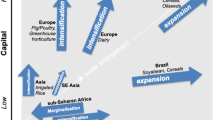Abstract
Interviews with Community Supported Agriculture (CSA) growers in Iowa, a majority of whom are women, shed light on the relationship between gender and CSA as a system of resource management. Growers, male and female alike, are differentiated by care and caring-practices. Care-practices, historically associated with women, place priority on local context and relationships. The concern of these growers for community, nature, land, water, soil, and other resources is manifest in care-motives and care-practices. Their specific mix of motives differs: providing safe and nutritious food, educating self and others, and building relationships with other growers, shareholder-members, and the land. Care-practices include reducing or eliminating chemical usage, encouraging or accepting beneficial insects and wildlife, building soil, and creating resource management partnerships with shareholder members. CSA, viewed through a lens of care, may offer a means of transcending gender stereotypes.
Similar content being viewed by others
References
Bowden, P. (1997). Caring: Gender-Sensitive Ethics. New York: Routledge.
Cheney, J. (1989). “Postmodern environmental ethics: Ethics as bioregionial narrative.” Environmental Ethics 11: 117-134.
Clement, G. (1996). Care, Autonomy, and Justice: Feminism and the Ethic of Care. Boulder, Colorado: Westview Press.
DeVault, M. L. (1991). Feeding the Family: The Social Organization of Caring as Gendered Work. Chicago: University of Chicago Press.
Fink, D. (1986). “Constructing rural culture: Family and land in Iowa.” Agriculture and Human Values (Fall) 4: 45-53.
Gilligan, C. (1982). In a Different Voice: Psychological Theory and Women's Development. Cambridge, Massachusetts: Harvard University Press.
Gradwell, S., J. DeWitt, D. Mayerfeld, R. Salvador, and J. Libbey (1999). Community Supported Agriculture: Local Food Systems for Iowa. Ames, Iowa: Iowa State University Extension, Pm-1692.
Kolodny, A. (1975). The Lay of the Land: Metaphor as Experience and History in American Life and Letters. Chapel Hill, North Carolina: University of North Carolina Press.
Kolodny, A. (1984). The Land before Her: Fantasy and Experience of the American Frontiers, 1630–1860. Chapel Hill, North Carolina: University of North Carolina Press.
Leopold, A. (1973). A Sand County Almanac. New York: Ballatine Books.
Plumwood, V. (1993). Feminism and the Mastery of Nature. New York: Routledge.
Riley, G. (1994). Frontierswomen: The Iowa Experience. Ames, Iowa: Iowa State University Press.
Robinson, F. (1999). Globalizing Care: Ethics, Feminist Theory, and International Relations. Boulder, Colorado: Westview Press.
Shiva, V. (1993). Monocultures of the Mind: Perspectives on Biodiversity and Biotechnology. Atlantic Highlands, New Jersey: Zed Books.
Sturgeon, N. (1995). “Theorizing movements: Direct action and direct theory,” in M. Darnovsky, B. Epstein, and R. Flacks (eds.), Cultural Politics and Social Movements (pp. 35-51). Philadelphia: Temple University Press.
Sturgeon, N. (1997). Ecofeminist Natures: Race, Gender, Feminist Theory, and Political Action. New York: Routledge.
Tronto, J. (1993) Moral Boundaries: A Political Argument for an Ethic of Care. New York: Routledge.
Van En, R. (1995). “Eating for your community: Towards agriculture supported community.” Context (Fall) 42: 29-31.
Warren, K. (1998). “Care-sensitive ethics and situated universalism.” Paper presented at Ecofeminist Conversation, March 13, Drake University, Des Moines, Iowa.
Wells, B., S. Gradwell, and R. Yoder (1999). “Growing food, growing community: Community supported agriculture in rural Iowa.” Community Development Journal 34(1): 38-46.
Author information
Authors and Affiliations
Rights and permissions
About this article
Cite this article
Wells, B.L., Gradwell, S. Gender and resource management: Community supported agriculture as caring-practice. Agriculture and Human Values 18, 107–119 (2001). https://doi.org/10.1023/A:1007686617087
Issue Date:
DOI: https://doi.org/10.1023/A:1007686617087




